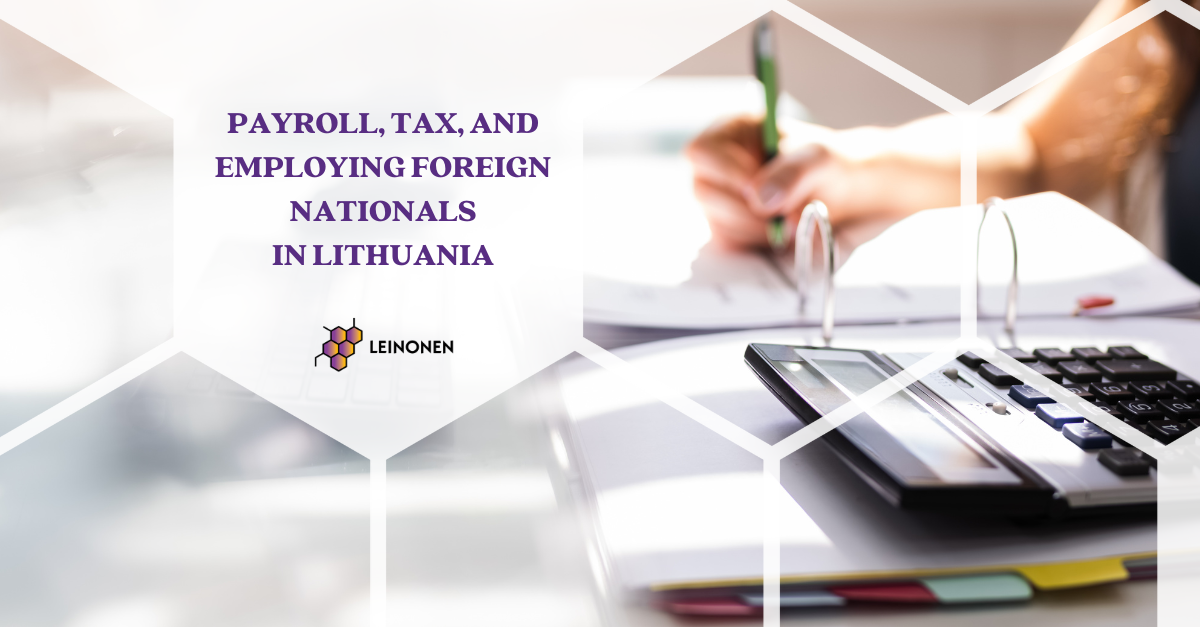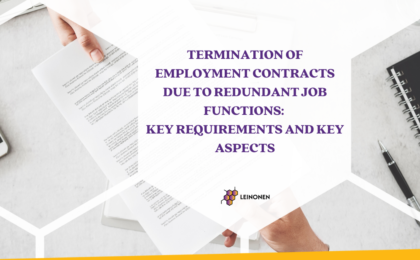With a diverse range of opportunities in work and education, an outstanding healthcare system, and a low cost of living compared to the rest of Europe, it is no surprise that so many foreign individuals and businesses choose to set up a base in Lithuania. But what does this mean for employers hiring foreign workers?
Responsibilities for Foreign Workers and Companies
Employee’s Responsibilities
EU Nationals
For those coming from other European Union (EU) member states, getting work in Lithuania is a fairly simple process. A work permit or decision on the compliance of foreign work with labour market needs from the Employment Service is not required. If the EU citizen plans to work and live in Lithuania for more than three months in half a year, they must obtain a certificate from the Migration Department that confirms their right to temporary residence in Lithuania.
Third-Country Nationals
Individuals not from the EU (third-country nationals) typically need to get one or more of the following to be able to work in Lithuania:
- A work permit alongside a national visa D (or Schengen visa for seasonal work). Work permits are typically issued for up to one year.
- A decision on the compliance of foreign work with the labour market needs. This can be issued for up to two years and allows a foreigner to apply for a temporary residence permit (TRP). They can begin working once a TRP has been obtained.
- The Blue Card. The Blue Card is available to foreign nationals with a higher education diploma or an equivalent minimum of three years’ professional experience as a manager in the information technology (IT) field. The Blue Card is a special type of TRP for skilled workers and can be issued for the length of an employment contract plus three months (up to a total of three years).
Employer’s Responsibilities
Hiring an EU National
As no work permit or decision on the compliance of foreign work with labour market needs is required, hiring an EU national in Lithuania is quite simple for employers. The key responsibility is to inform the State Social Insurance Fund Board of Lithuania that you are employing an EU National with an LDU announcement.
Hiring a Third-Country National
If you are hiring someone from outside the EU, you must:
- Assess the person’s qualifications. This will help determine which TRP is suitable. For example, their profession may be on the list of those needed in Lithuania, or they may be a skilled worker that qualifies for the Blue Card.
- Determine how long they will be needed. Are they in Lithuania for seasonal work (up to six months in a year), or for a longer period (one to three years)? This can impact the type of TRP they are eligible for.
- Submit an LDU announcement informing the State Social Insurance Fund Board of Lithuania regardless of whether they are an EU citizen or a third-country national.
LDU announcements:
- Should be submitted no later than one working day before commencement of the employment.
- Are not required if the work does not fall into the Labour Code of Lithuania’s description (e.g., workers traveling on business for conferences or meetings, art tours and sailors).
Who is Responsible for Taxes?
In general, the responsibility of calculating and reporting payroll related taxes lies with the employer. The exception to this rule is when a person is employed by a foreign company registered for tax purposes but not permanently established in Lithuania. In this case, it is down to the employee to report and pay their own personal income tax (PIT). If you are an employer hiring foreign workers, it is important to use a licensed payroll software capable of making calculations for both residents and non-residents of Lithuania.
Key tax differences for cross-border employees in Lithuania:
- Non-taxable amount for PIT purposes. Employers cannot apply a non-taxable amount for PIT purposes to a foreign employee’s payroll calculation unless the employee has been in Lithuania for more than 183 days and has written a valid application. Non-resident employees can apply for this at the end of the calendar year by submitting a GPM314 report.
- Social security contributions (SSC). Foreign employees holding a work visa only need to pay 12.52% in SSC, as opposed to 19.5% for Lithuanian residents.
Why Getting Cross-Border Payroll Right is Important
Challenges and Risks for Businesses Hiring Foreign Employees
Getting work in Lithuania as a foreigner can be a long process consisting of documents submission, interviews and consultations among public institutions like the Migration Department, Employment Services, and the State Labour Inspectorate. This is especially true for individuals from outside the EU who must apply for a work permit. From a business’ perspective, this could mean delayed contract start dates.
Employers can also be heavily sanctioned for employing a foreigner illegally, so it is vital to ensure all foreign employees have gone through the correct procedures to work legally in Lithuania. Not only can businesses be slapped with hefty fines, but they may be excluded from participating in public procurement and have their right to receive subsidies revoked. They may also be unable to employ foreigners for a year and be considered an unreliable taxpayer for three years. All these sanctions can have devastating effects on a business, hindering its potential for growth.
Where to Find More Information
It is always advisable to consult with a range of reputable sources to expand your knowledge on cross-border payroll and taxes. Here are a few great resources:
- Official Migration Department webpage: https://www.migracija.lt/
- Official Public Employment Service webpage: https://uzt.lt/en
- Official State Labour Inspectorate webpage: https://www.vdi.lt/?lang=en
- Official State Social Insurance Fund Board webpage (on LDU announcement): https://www.sodra.lt/en/benefits/i-employ-a-foreigner
- Official State Social Insurance Fund board website (on contribution rates): https://www.sodra.lt/en/benefits/contribution-rates/contribution-rates-for-employees
- Official State Tax Inspectorate website (on non-taxable amount for PIT purposes): https://www.vmi.lt/evmi/en/pajam%C5%B3-deklaravimas1
Leinonen Lithuania can Help
Foreign employees can bring a wealth of knowledge and innovative perspectives to a business. But for the sake of the company and your reputation as an employer, ensuring that cross-border payroll and taxes are done correctly is paramount.
While familiarising yourself with official resources like those listed above is worthwhile, the best way to guarantee compliance is by working with an expert accounting firm. With 26 years supporting foreign businesses making a base in Lithuania, Leinonen’s expert accountants can give you the peace of mind you deserve.





